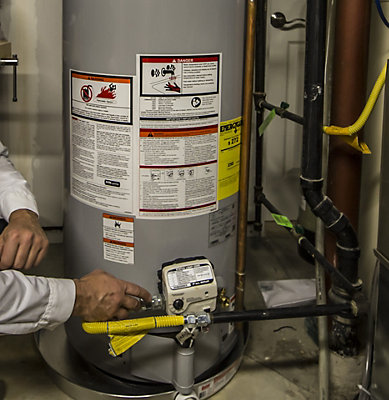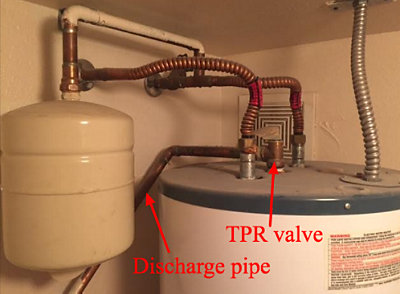Why Is My Water Heater Whistling?

That whistling noise you hear is most likely your water heater’s temperature and pressure relief (TPR) valve opening to relieve extra pressure inside the water heater.
In this article, we’ll discuss:
- How your TPR valve works
- What causes excess pressure to build in your water heater
How your TPR valve works
Your temperature and pressure relief valve (aka “TPR valve”) is designed as a safety mechanism to prevent your water heater from exploding in your home.

TPR valves are usually located on top of the tank or on the side of the tank. The valve is always attached to a discharge pipe that diverts hot water away from the heater.
You see, water expands as it heats up inside your water heater. Now, your water heater is designed to handle a certain amount of pressure. But if the temperature of your water is too hot, pressure builds to dangerous levels inside the water heater, risking an explosion.
That’s where your TPR valve steps in to save the day.
As soon as the pressure inside your water heater hits unsafe levels, that valve automatically opens to let out hot water. This relieves the pressure inside the tank (and often makes a whistling sound as it does so).
But here’s the bad news: TPR valves often don’t open until pressure surpasses 150 psi (pounds per square inch). And even though your water heater can handle pressure around 150 psi, it’s not good for it (or your plumbing, for that matter).
So if your TPR valve is whistling and discharging water, you need to call a plumber ASAP to fix the problem.
“What’s causing too-high pressure in my water heater?”
Some water heater problems that can result in pressure build-up include:
Your temperature is set too high
Every water heater has a water temperature setting that can be adjusted. If the water temperature is set too high, though, it can eventually cause unsafe pressure inside the water heater.
What to do: Make sure your water heater temperature settings are well below 140 degrees F. In fact, the Department of Energy recommends keeping the temperature at 120 degrees F to save money and prevent pressure issues.
The exterior water supply is coming in at too high pressure
As water travels into your home from the municipal water supply, it does so at a fixed pressure. Anything over 65 psi is considered “high” pressure and can make the pressure in your water heater skyrocket.
You have a defective thermostat
Your water heater thermostat should shut off the burners once the water reaches your set temperature. But if the thermostat is bad, it will allow the water to continuously heat until the pressure reaches unsafe levels, eventually triggering your TPR valve.
Sediment is building up inside the water heater
Over time, “hard” minerals in your water (calcium and magnesium) settle to the bottom of your water heater and accumulate, creating a barrier between the water and your water heater’s burners. This causes your burners to stay on longer than they should, overheating the water and allowing pressure inside the water heater to build.
A tell-tale sign that you have sediment buildup is a popping, knocking noise coming from your water heater.
What to do: Have a professional plumber flush your water heater to get rid of that pesky layer of particles coating the bottom of your tank.
Need help from a Denver plumber?
If you're in the Denver area and your water heater is still whistling or making a high pitched noise and you’re not sure why, contact us right away. We’ll send over a plumber who can locate the issue and repair your water heater before any major damage occurs.
See also:
FAQs about Whistling Water Heaters
Q: What should I do if the whistling persists after flushing the water heater?
A: If flushing the water heater doesn't resolve the issue, it's possible that other factors, such as high water pressure or a faulty valve, are causing the whistling. In such cases, it's best to contact a licensed plumber to inspect and diagnose the problem.
Q: How often should I have my water heater inspected?
A: It's a good idea to have your water heater inspected annually by a professional plumber to ensure it's operating safely and efficiently. Regular maintenance can help prevent problems such as whistling and prolong the lifespan of your water heater.
Q: Is it safe to troubleshoot and repair my water heater myself?
A: While some water heater issues can be addressed through DIY methods, it's important to exercise caution when working with gas or electrical appliances. If you're unsure or uncomfortable with troubleshooting or repair tasks, it's best to leave them to a qualified professional.
Need help from a Colorado Plumbing, Heating, Cooling, or Electrical Specialist?
For your convenience, you can request an appointment in one of two ways:
- Call us at (303) 436-2525 for immediate assistance.
- Click on the button below to schedule your appointment online.
Related Reading
Join Our Email Newsletter
Receive updates, current news, promotions, and industry tips.
